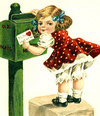
|
Healing Hug Home with links to my other websites
Healing Hug Guestbook or Read Entries about this website
Webmaster's Bio
Related Articles
Prayer Is Not a One-way Street
What Is Your Religion
Hallowe'en or the Reformation
|
What Is a Christianby Traute Klein, biogardener
Definition please!I am a philologist. I trace the meaning of a word from its root and its original use to its present meaning. Too often we lose sight of the significance of words by focusing on a usage which appears to be popular at the moment. History is a great teacher. Let's learn from it, even when it comes to understanding words.
Christian, what does the word mean?The word Christian was first used to describe the followers of the fanatical rabbi who had been executed by the Romans. The term was not meant as a compliment. Soon, however, people noticed something about those weird "Christians" which set them apart from the rest of the population. They said about them, "Behold, how they love one another."
To their contemporaries, a Christian Wouldn't it be great if people were to say the same thing about Christians today? As a matter of fact, that is exactly what they are saying in the countries where Christians are persecuted. Under persecution, Christians do not have the time and energy to squabble about trivialities. It seems, however, that standards become relaxed as soon as Christianity becomes respectable.
Catholic, what does the word mean?The adjective "catholic" originates in the Greek. The prefix "kat-" means "according to" and the adjective "holos" means "whole, entire." Church language is mainly derived from the Latin, and in that language "catholicus" is used to encompass "all of mankind or the entire world," in other words, it has the same meaning as the English words "universal, global, comprehensive." Originally that word meaning experienced wide usage, not just in regard to religious matters. The Athanasian Creed talks about the "catholic faith," and the Apostle's and Nicean Creeds refer to the "catholic church." This is generally translated as "the church universal," using the reverse Latin word order. Those creeds can be found in the order of service of many denominations, and some of the major protestant churches recite one or the other in almost every service. Members know that the word "catholic" is not reserved for a particular denomination but refers to the entire body of Christ. Not until the Reformation did the word come to denote a denomination, namely the Roman Catholic Church.
Protestant, what does the word mean?The word "protestant" was never meant to separate the believers of the various Christian denominations. Originally, "protestant" meant "to be a witness for something" rather than to be against something, as the current popular interpretation of the word seems to imply. We all know that the prefix "pro" means "for" in Latin. The Latin adjective "protestans" refers to "a person who gives public testimony for something or who proves or demonstrates something." The Book of Acts, also called "The Acts of the Apostles" abounds in references to the fact that all Christians are witnesses to what they have seen and experienced. The reformers of the 16th century had no intention of starting a new church. They simply wanted to stimulate dialogue to help the church to return to its roots as outlined in the Book of Acts. Martin Luther, for example, posted his theses on the church door in Wittenberg to stimulate public discussions. I explain the process in my article "Hallowe'en or the Reformation" which is linked in the left column. It was his excommunication by the church which led to the founding of a new denomination. At the Diet of Speyer in 1529, the German princes who supported Luther "protested" his excommunication, and that became the birth of the term "Protestant" as a religious movement, but I lean toward calling it a political movement of the time. I do not like protests. I think of myself as a Protestant not because I belong to a certain denomination but because I bear witness to the good news of Jesus Christ. I also call myself Catholic, because I belong to the Universal Church. All Christians can correctly call themselves "Catholic" as well as "Protestant." After all, if we are to get along with each other in heaven, let's get into the habit here on earth. |
The material on this site may be reproduced or republished only by special arrangement with the webmaster.
You are, however, welcome to pass on or link the URL.
